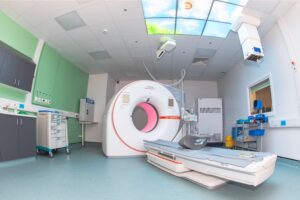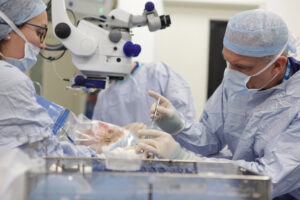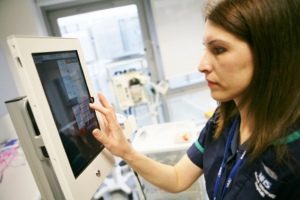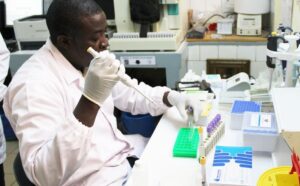
We have developed technology that can identify who is at risk of a heart attack several years before it happens.
Using AI alongside CT scans, we have identified biological ‘red flags’ in the vessels that supply blood to the heart which can indicate a future heart attack. The AI tool has been found to improve treatment for up to 45 per cent of patients and could change the management of patients referred for chest pain investigations across the NHS.

Using data from nearly 50,000 volunteers, we found effective treatments for people hospitalised with severe COVID-19.
The RECOVERY Trial operated across 187 sites and identified four life-saving treatments for COVID-19, while proving that several commonly used treatments were not effective. The RECOVERY trial, which has saved hundreds of thousands – if not millions – of lives worldwide, has now been expanded to test treatments of other types of pneumonia, including influenza.

Our research has transformed the way strokes are treated worldwide.
The unique OxVasc study has been running for over 20 years and recruited over 13,000 participants. It changed clinical practice and led to the widespread development of emergency stroke prevention clinics after identifying the need to act quickly after TIA mini-strokes to prevent more serious strokes. The study showed that such urgent treatment following TIAs reduces the risk of major stroke by 80 percent, one of the most effective interventions across all of medicine.

We are developing a range of gene and stem-cell therapies to treat the causes of blindness.
The world’s first gene therapy operation to tackle age-related macular degeneration (AMD), the UK’s most common cause of sight loss, was carried out at the John Radcliffe Hospital in 2019. Oxford was also the first UK centre to use a revolutionary new stem cell transplant as a way of treating retinitis pigmentosa (RP), an inherited cause of blindness, while gene therapy to treat RP and another condition called choroideremia have shown promise.

Our technology and data researchers developed the digital monitoring system used across our hospitals, allowing patient data to be recorded accurately and accessed instantly, so transforming care and safety.
The System for Electronic Notification and Documentation (SEND) completely replaced the previous paper-based patient records with tablets, meaning information about patients’ vital signs – such as whether their condition is deteriorating – can be accessed by clinicians anywhere in real time. The implementation of SEND resulted in a big drop in cardiac arrests among vulnerable patients; but it also saved time by reducing the time taken to input patients’ vital signs by up to 30 percent.

We are the only BRC that has a vaccines theme and, as well as developing the Oxford/AstraZeneca COVID-19 vaccine, which is estimated to have saved more than 6 million lives, we have developed new effective vaccines against malaria and typhoid.
The malaria vaccine was recommended for use by the World Health Organisation in October 2023, having met the WHO’s safety and efficacy goals in trials across several African countries, while a large field study in Nepal showed that the typhoid conjugate vaccine developed in Oxford was over 80 percent effective in tackling the disease.